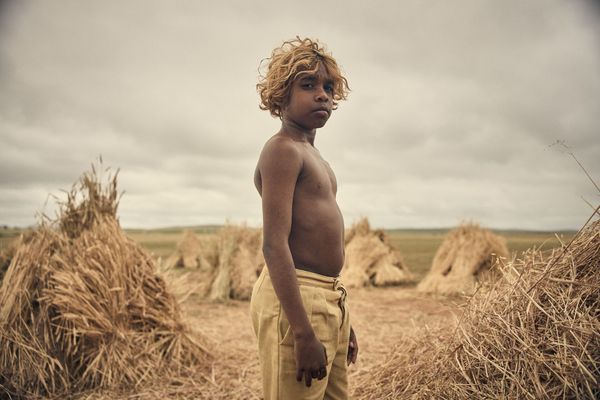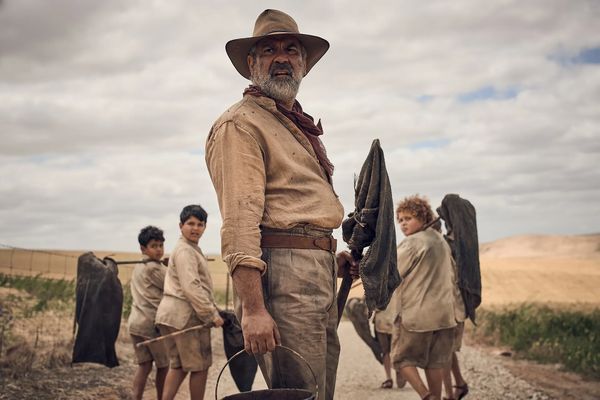 |
| Aswan Reid in The New Boy. Warwick Thornton: 'He's highly intelligent and just used his ‘inner-inner’. He understood the new boy's journey because he's on that journey himself' Photo: Dirty Pictures |
They always say never work with children and animals and you don’t just have one kid here but a whole schoolroom of them…
Warwich Thornton: The first day of the shoot, we had all eight kids and a horse and a bucket full of snakes and six sheep. I was completely naive to that theory, don’t work with animals or kids. But we survived it. They're amazing, the children. None of them had acted before, so they joined the circus for six weeks. They didn't have to go to school. So they were very happy.
They were really beautiful because Aswan’s pretty much in every single scene in the film. And the other kids would only work half a day. So he’d get really upset that he had to stay. But they kind of made their own little roster so one of them would stay with him and they did that off their own bat, which was amazing.
It's a really hard role for Aswan because it's such a silent role. How was that? Did you have a lot of rehearsal with him?
WT: Not really. The interesting thing about Aswan is that he is the new boy in a strange way. We plucked him out of an Aboriginal community in the middle of nowhere, in the desert and he came to this film set. We did this very 101 thing about how to act and Cate worked with him a fair bit as well. But he is the new boy because we plucked him out of this bloody community, put him on a film set, and he watched everything and everyone and just worked out how everything was happening, and how to survive me and the crew, in a way. He's highly intelligent and just used his ‘inner-inner’. He understood the new boy's journey because he's on that journey himself.
It’s interesting that your last couple of films have been rooted in history
WT: I'm writing a film at the moment. It’ll be a feature, it’ll be very small and won’t necessarily need much money. And it's a present-day film and I’m really scared of it. I've found myself loving period. I think I have more control. It's sort of like, you know, I'll never make a movie about three friends in a flat in Soho.
When you say more control, in what way?
WT: Well, if it was a period film in the city it would probably freak me out. But you know, cinematically, because it all has to be correct, with period I have so much more control visually.
I suppose it’s less messy in a way, isn't it? If you do something modern, you’ve got a lot of clutter. Your movies, especially this one, are beautifully uncluttered.
WT: Especially with the camera department, because I shot it as well, I call it “decluttering”. I’ve got so used to using three cameras. I did a bit of television with three cameras. And when you’ve got three cameras, you have to work twice as fast because you've got multiple angles, so you kind of walk away when you're shooting with three cameras going, saying ‘I got something - and I’ve got three angles’. We did three setups, that's nine different angles, we must have something, let's move on. And it's a terrible way to direct. So with this film, I decided on one camera, and a choice of only three lenses to declutter the whole system because then I would not move away from that shot until I knew I had it. Not something, I had exactly what I wanted. It took a lot longer and it was a stupid idea because I had eight children who had no idea about continuity.
That’s actually one of the main things we taught them, about continuity. But the decluttering? I really enjoyed it. Then you have the camera in the right place. When you’ve got three cameras, there’s always a little bit of compromise.
So do you think you’ll stick with that going forward?
WT: I'd like to. It puts a lot more pressure on you. You don't get extra days to shoot because you’ve got one camera so you have to work a lot faster. I'd really like to but it's kind of horses for courses.
This is such a focused film. I was going to say a quiet film but the scoring is lovely and very wide and deep.
WT: Originally I talked to Warren Ellis and Nick Cave about the film - they read the script and they loved it - and I said, “You know, I think it's going to be like some Seventies Italian movie, sort of very sparse. You might hear footsteps and a bit of breathing”, they were light on the atmosphere back in those days. Yeah. And when we did a rough cut it was feeling just like that. Then just for shits and gigles, I thought, I’ll put some music in and see what happens. And I put in some Hans Zimmer, the pop star of scores - there's three chords that emotionally twitch every heartstring and he knows them and that's all he uses. Anyway, I put it in and it was a fucking dumb idea because it worked so well. It was brilliant.
The movie just bloomed. It was a good tree but suddenly it flowered and fruited. So I had to ring Nick and Warren and go, “Shit, sorry”, because I’d told them, “I just need a little bit here and there. Just a little bit of martial movement in certain scenes”, and I said “I'm really sorry, scratch that, it’s going to be wall to wall. Originally it was one viola, now it’s 50 cellos.” It was hilarious because they were very grumpy at the beginning… well not very grumpy, but sort of quite silent and a bit huffy. And they went through the process and because it’s 40 bloody cellos they'd never done that before. Then they just loved it. They were out of their comfort zone and they were in a place that they knew about but they’d never been. So I think they got scared and because they're so brilliant, they did such an amazing job. It empowered them and I think it made them stronger in a way I think.
So this next film, I guess it’s not going to be set in the city?
WT: It'll be in the country but it's modern day. I've got a couple of scripts floating around at the moment.We just had the vote in Australia on the constitution. It was a disaster, 60% of Australians said no to recognising Aboriginal people in the constitution. In a strange way, for indigenous people, the vote was a massacre for us, as usual, but it actually showed us where we stand and what Australia does think of us. So if you want to find a positive side to it, there’s no illusions any more about Australia.
I'm being careful with this film because I'm very fucking angry about that. So the film’s come out of anger. It’s almost like writing this film is like going to a shrink for me at the moment. So it's kind of healing me. The things that do come out of anger, they’re going to get pulled out. It needs to be a film about love, it can’t be a film about fucking racist fucks. The script is a healing process so after I talk to you I’m going to go back and pick up - because I write with pen and paper - so I'll get back and keep writing.
Read the first part of our interview with Thornton on the evolution of The New Boy






















